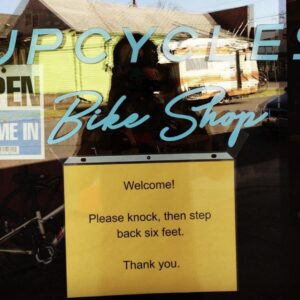
(Photo © J. Maus/BikePortland)
A three-part series written by Rebecca Small and Shawn Small. See the rest of the guides here.
Uncertainty is hardly a new sensation for small business owners. Throw in a pandemic, a statewide lockdown, and implosion of the national economy and our local entrepreneurs find themselves facing previously unknown levels of apprehension and sleepless nights. Lately it may seem like there are a million possible wrong choices.
Every one of the nearly 100 different bike-related business in Portland, from the biggest bike shop in town to a self-employed bike fitter, falls into the category of a “small business” – by definition, a company with fewer than 500 people. Most are much smaller: 9 out of 10 businesses in Oregon have fewer than 20 employees. Despite their size, they employ 55% of the state’s workers. They are critical economic engines of our community.
Portland’s bike-related businesses are the creators of the culture who make this city what it is. If you are one of them, then this short series of articles is for you.
But these businesses are so much more than job creators. What would cycling in Portland be without the bike makers, race promoters, and ride organizers that create our vibrant bike scene? Or the sports therapists and trainers who keep us feeling good in the saddle? Or the apparel designers whose gear keeps us riding through the rain? Without the accessory designers and manufacturers who make our rides safe and functional? Or the pedicab and rental shops who help put more people on wheels? Or the content creators who reflect our shared experiences? The engineering firms who design safe facilities? The mechanics who fix our flats? The couriers who deliver our food and drinks? And where would we be without the non-profits who advocated for our right to the roads and trails?
Portland’s bike-related businesses are the creators of the culture who make this city what it is. If you are one of them, then this short series of articles is for you. It will be a rough road ahead, and there is a lot of information coming at you fast. But if we can share that information and support each other then hopefully we will all come out of this crazy time intact – bruised and maybe missing a few teeth and fistfuls of hair — but intact and ready to re-build.
The first of three articles will be about unemployment. Tomorrow and Friday we’ll delve into how to access loans, grants, and other resources. Let’s get started…
Advertisement
Part 1: Basics of Unemployment
Some of our bike-related businesses, like our essential bike shops, may be able to continue operations. Others, like race promoters or bicycle tour companies, have been faced with a full-stop, sudden cessation of work and income. For many, there is simply no other option than to lay off staff or close down completely.
There is never a good time to have to lay off members of your staff. But thanks to Oregon’s own Senator Ron Wyden, who fought to get an additional $250 billion in expanded unemployment benefits added to the federal Coronavirus Aid, Relief and Economic Security (CARES) Act that passed last week, people who have lost work due to COVID-19 will have a much softer landing.
State Unemployment
If you are a business owner with employees on payroll, you pay state and federal taxes that help finance unemployment insurance benefits. An employee can apply to claim state unemployment insurance benefits if they have been let go from their job through no fault of their own; each claim can result in your unemployment tax rate increase in future years. The amount of a worker’s weekly benefit check is up to 60-65% of their previous wages, up to a maximum payment of $648. Typically these benefits are available for only 26 weeks, but thanks to the new CARES act these benefits have been extended for an additional 13 weeks – enough to last until the end of 2020.
UPDATE, 4/6: Self-employed people and others who are generally not eligible for state unemployment, but these benefits have recently been expanded in light of COVID-19. State of Oregon issued this guidance on April 3, 2020: “Under the new federal CARES Act, Self-employed individuals are now eligible for benefits and should file an application for a benefits claim. The Employment Department is currently reviewing all the new federal legislation and will provide more information once we receive the required U.S. Department of Labor guidance so that we can carry out these changes as quickly as possible.”
You or your employee can apply for unemployment benefits online or by phone (1-877-FILE-4-UI), but online is recommended. Independent contractors, gig workers, freelancers, and sole proprietors are unfortunately not eligible for state benefits.
Additional CARES Act Unemployment Benefits
In addition to the standard unemployment benefits they receive from the State of Oregon, the federal relief package ensures that people who are out of work can receive a $600 payment per week for up to four months – equivalent to what someone would earn working 40 hours a week at $15/hr. Self-employed people who aren’t eligible for state unemployment ARE are able to receive this $600. Employees go through the standard application unemployment process to enroll.
Advertisement
The Oregon Health Authority also recently received permission from the federal government to expand Medicaid coverage, making it easier for unemployed people without insurance to enroll for low-cost or free medical care.
“I filed for state unemployment shortly after I was laid off. The stimulus bill might add $600 per week – if so, I’ll be able to cover my bills.”
— Michael Kloeppel, former Rack Attack employee
With the $600 supplement in addition to the regular unemployment benefit, many employees could make more money being unemployed than employed. If you are in a financial position to keep staff on at full or part time, but they would make more money on unemployment, this sets up a predicament. How do you balance what will be most lucrative for your staff with what your business needs to stay afloat? Each situation will be unique, but here are a few considerations to keep in mind.
First, remember that the survival of your business matters. If your business goes under because you let too many staff go or you kept on more people than you could afford, then none of those jobs will exist a year from now.
Second, don’t assume that people would rather be out of work even if they might earn more on unemployment. If your company helps with health insurance or offers any other benefits, staying connected to these may be more valuable to your employee. And the security of having a job right now counts for a lot.
Michael Kloeppel had worked as a sales associate at Rack Attack for over 10 years before being laid off on March 29th. “I filed for state unemployment shortly after I was laid off. The stimulus bill might add $600 per week – if so, I’ll be able to cover my bills,” Kloeppel shared with is. “The ‘extra free time’ is nice… but unsettling.” Kloeppel said he expects to be re-hired when business rebounds.
When unemployment benefits run out, millions of people will suddenly be looking for jobs at the same time and it’s unlikely that they’ll be returning to a robust economy rife with the abundant job opportunities that were available pre-pandemic. Check in with your staff and see how they’re feeling.
Finally, know that there are some very good options out there right now to help you maintain your staff at full or part-time levels. We’ll talk about those tomorrow. Stay tuned.
See all three parts of this series here.
— Rebecca Small is a writer who translates policy and technical documents into stories and infographics for “fun”. Shawn Small is the founder/owner of Ruckus Composites and is navigating these issues right alongside his fellow small business owners.
— Get BikePortland headlines delivered to your inbox.
— Support this independent community media outlet with a one-time contribution or monthly subscription.







Thanks for reading.
BikePortland has served this community with independent community journalism since 2005. We rely on subscriptions from readers like you to survive. Your financial support is vital in keeping this valuable resource alive and well.
Please subscribe today to strengthen and expand our work.
The maximum unemployment benefit in OR is $648.
https://www.oregon.gov/employ/Documents/UI%20101%20Question%20and%20Answer%20Sheet_FINAL.pdf
fwiw, the link u provided was produced on 3/24.
the federal bill bumping unemployment benefits was passed 3/27:
“The CARES Act provides for a weekly payment of $600 in addition to the unemployment benefits to which an individual is entitled (“Pandemic Unemployment Compensation”). …fully funded by the federal government, and will be available through July 31, 2020.”
Thanks for the great catch!
Thank you. Story has been corrected.
my understanding of recent federal legislation that small businesses can receive loans that will be forgiven if the funds are used for rent and payroll and they don’t lay off employees.
I don’t think this is widely known, and it should be. could make a very big difference for how small businesses make important decisions.
There is a statement that : Independent contractors, gig workers, freelancers, and sole proprietors are unfortunately not eligible for state benefits. This is as I understand it incorrect. With the CARES Act freelancers and independent contractors are now eligible for state unemployment benefits.